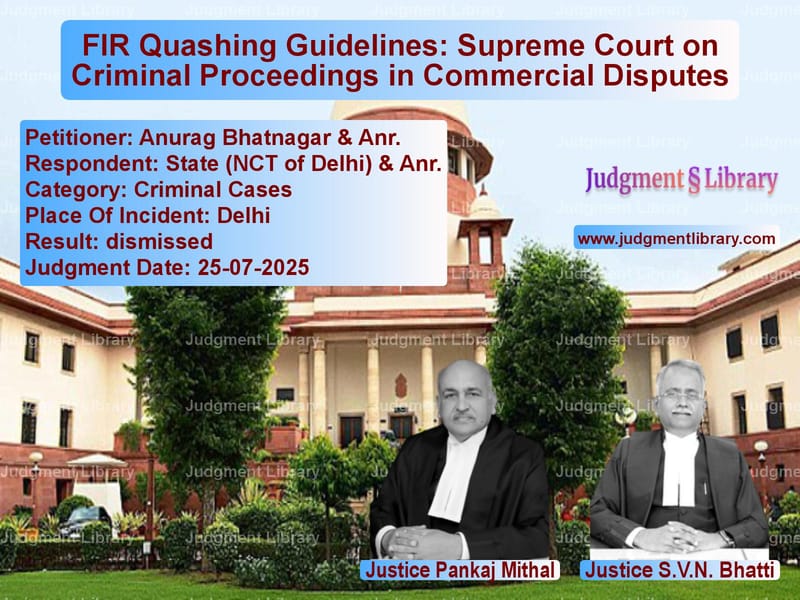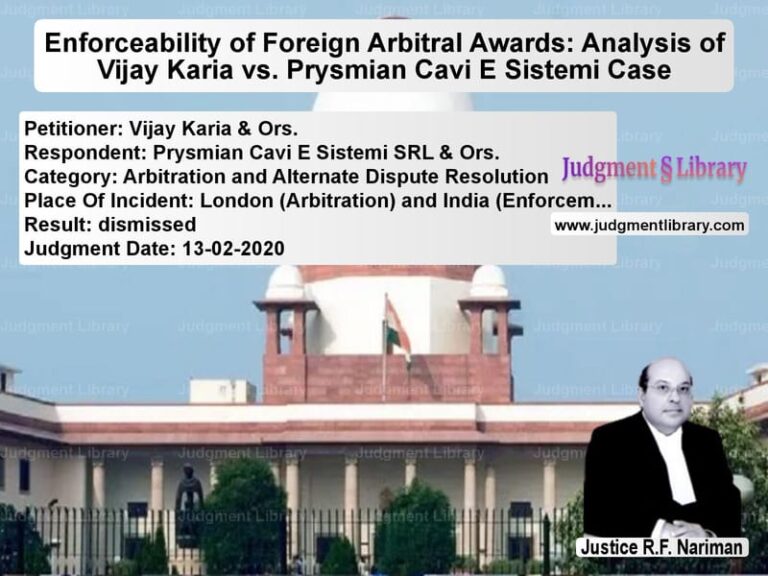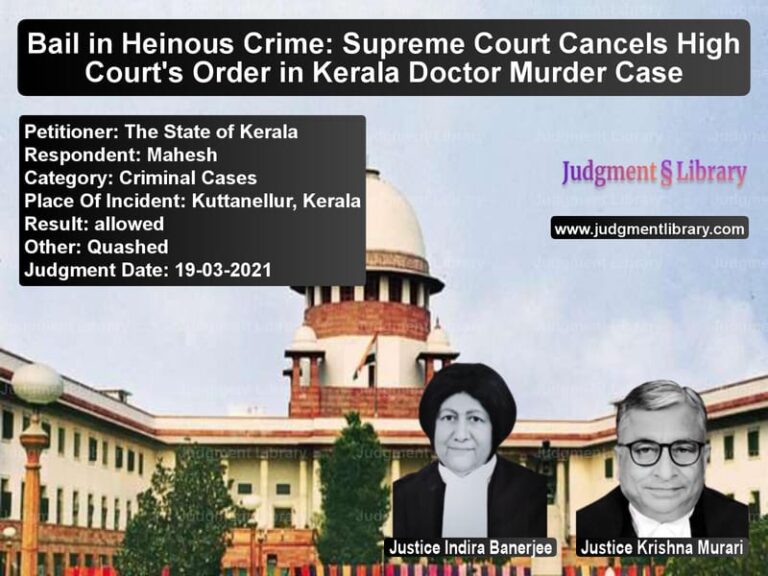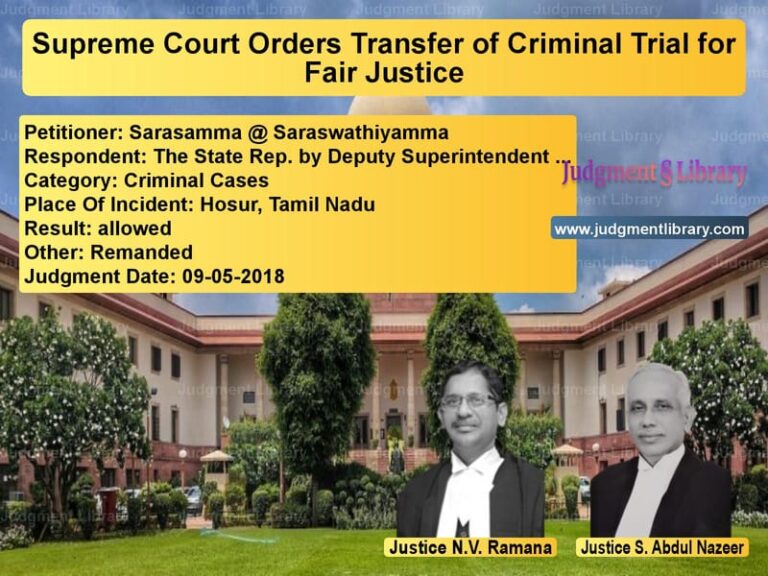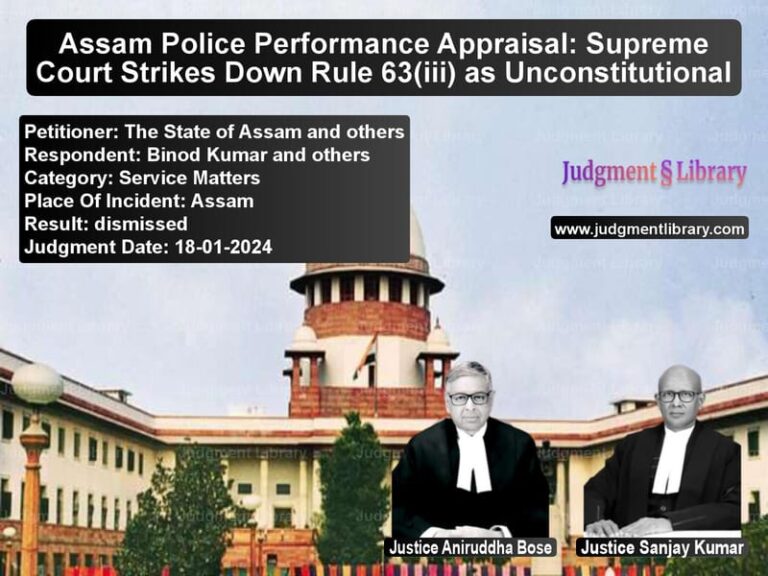FIR Quashing Guidelines: Supreme Court on Criminal Proceedings in Commercial Disputes
The Supreme Court of India recently delivered a significant judgment addressing multiple petitions seeking quashing of FIRs in a complex commercial dispute between M/s Sunair Hotels Limited (SHL) and VLS Finance Limited. The case involved allegations of cheating, criminal conspiracy, and breach of trust arising from a Memorandum of Understanding between the companies for developing a hotel project in Delhi.
The dispute originated in 1995 when VLS Finance approached SHL with a proposal to join their hotel project as financial consultants. The companies entered into an MoU where VLS promised to invest Rs. 7 crore as equity, provide Rs. 10 crore as security deposit, and launch a public issue of 10 lakh equity shares at a premium of Rs. 100 per share. However, SHL later discovered that the promise to issue shares at such a premium was legally impossible due to SEBI guidelines requiring a three-year track record of consistent profitability, which SHL as a new venture couldn’t meet.
The legal battle spanned over two decades, involving arbitration proceedings, multiple FIRs filed by both parties, and several rounds of litigation. The Supreme Court’s judgment provides crucial guidance on when courts should exercise their inherent powers to quash criminal proceedings and the procedural requirements for filing applications under Section 156(3) of the Criminal Procedure Code.
Procedural Requirements for FIR Registration
One of the key issues before the Court was whether an application under Section 156(3) CrPC could be filed directly without first approaching the police authorities. The petitioners argued that the Metropolitan Magistrate had ordered registration of the FIR without compliance with the mandatory procedure under Section 154 CrPC.
The Court examined the statutory framework, noting that Section 154 CrPC provides that information about commission of a cognizable offence should first be given to the officer-in-charge of the police station. If the police refuse to record such information, the informant may approach the Superintendent of Police under Section 154(3). Only if both these remedies are exhausted without success can the informant approach the Magistrate under Section 156(3).
The Court observed: “A plain and simple reading of Section 154 CrPC as a whole makes it imperative upon the informant to first approach the officer-in-charge of the police station for the purposes of lodging an FIR in respect of a cognizable offence and where the Police refuses to record such information, the remedy is to approach the concerned Superintendent of Police.”
However, the Court found that while the Magistrate ought not to ordinarily entertain an application under Section 156(3) CrPC directly without exhaustion of remedies under Section 154(3), the order passed by the Magistrate would not be without jurisdiction and would only amount to a procedural irregularity.
Application of Mind by Magistrate
The petitioners contended that the Metropolitan Magistrate’s order dated July 1, 2005, was passed without proper application of mind. The order stated that the Magistrate had “heard” the counsel and “perused” the complaint, and found that it disclosed commission of a cognizable offence.
The Court emphasized the importance of reasoned orders in judicial proceedings, stating: “It is a well recognized principle of law that whenever any power is bestowed upon a judicial authority, it is incumbent that it should be exercised on the basis of sound legal principles by application of mind and by a speaking order.”
The Court referred to its earlier decision in Union of India vs. Mohan Lal Capoor, noting that “reasons are links between the material on which the conclusions are based. They disclose how the mind is applied to the subject-matter for a decision. They reveal rational nexus between facts considered and the conclusions reached.”
However, examining the specific order, the Court found that the Magistrate had indeed applied his mind: “The fact that the perusal of the application and complaint attached to it, satisfied the Magistrate that it discloses a cognizable offence, is very material and relevant which proves the application of mind by him.”
Civil vs Criminal Nature of Dispute
A central contention of the petitioners was that the dispute was essentially civil in nature, arising from breach of contractual obligations under the MoU, and therefore criminal proceedings should not be allowed to continue.
The Court acknowledged that breach of conditions of an MoU or allegations of false promises may not necessarily give rise to criminal action. However, it noted: “There are elements of inducement, criminal conspiracy and cheating which are also borne out from the allegations made in the application and the complaint, which if proved, may amount to commission of an offence.”
The Court also made a significant observation about the conduct of the parties: “The breach of conditions of the MoU or allegations of false promises in relation to the aforesaid MoU are undisputedly subject matter of the different FIRs lodged by VLS itself. Therefore, violation of those conditions for some reasons have been considered by VLS to be offensive. Therefore, the High Court rightly held that if breach of those conditions of the MoU itself has been considered to be of criminal nature by VLS, it cannot be permitted to turn around and allege that such breach of conditions would be of pure civil nature.”
Successive FIRs and Abuse of Process
The petitioners argued that the present FIR No. 380/2005 was a successive FIR based on the same allegations as contained in an earlier FIR No. 326/2004 and therefore could not be investigated independently.
The Court examined this issue in detail, noting that while Section 300 CrPC debars a second trial based on the principle that no one should be harassed twice for the same offence, the situation with successive FIRs requires careful consideration.
The Court referred to its decision in Jatinder Singh & Ors. vs. Ranjit Kaur, observing that “there is no provision in the CrPC or any other statute which debars a complainant from preferring a second complaint on the same allegations if the first complaint did not result in conviction, acquittal or even discharge.”
In the present case, the Court found that while both FIRs were based on similar allegations concerning breach of the MoU, they were not virtually the same. The allegations were different, and the parties against whom the FIRs were filed were not identical. Moreover, the earlier FIR No. 326/2004 had been stayed by the High Court with no further progress, meaning there was no trial resulting in conviction or acquittal.
Exercise of Discretionary Powers
The Court emphasized the discretionary nature of powers under Section 482 CrPC and Articles 226/227 of the Constitution, stating that these powers should be exercised with great caution and circumspection.
The Court referred to the established principles from State of Haryana & Ors. vs. Ch. Bhajan Lal Singh & Ors., noting that courts should be very slow in interfering with the process of investigation. It is only in rare cases where no cognizable offence is disclosed in the FIR that courts may stop the investigation to avoid harassment of the accused.
In the present case, the Court found that since investigations had been completed and chargesheets filed pursuant to FIR No. 380/2005, and since the Magistrate’s order directing registration of the FIR suffered only from procedural irregularity rather than jurisdictional error, there was no justification for interfering with the High Court’s decision to refuse quashing of the FIR.
The Court observed: “Once much water has flown down the bridge subsequent to the order of the registration of FIR and the registration of FIR, giving rise to a fresh cause of action to challenge the chargesheets, we are of the opinion that the High Court has rightly refused to exercise its discretionary jurisdiction so as to interfere with the FIR as the investigations have been completed and the chargesheets have been filed.”
Conclusion
The Supreme Court ultimately dismissed all the petitions, allowing the criminal proceedings to continue. The judgment reinforces several important principles of criminal jurisprudence: the importance of following proper procedure for FIR registration, the requirement of application of mind by magistrates while passing judicial orders, the distinction between civil and criminal disputes in commercial matters, and the cautious approach courts must adopt while exercising inherent powers to quash criminal proceedings.
The decision serves as a significant precedent for similar cases where commercial disputes involve allegations of criminal misconduct, providing clarity on when courts should allow criminal proceedings to continue and when they should intervene to prevent abuse of process.
Petitioner Name: Anurag Bhatnagar & Anr..Respondent Name: State (NCT of Delhi) & Anr..Judgment By: Justice Pankaj Mithal, Justice S.V.N. Bhatti.Place Of Incident: Delhi.Judgment Date: 25-07-2025.Result: dismissed.
Don’t miss out on the full details! Download the complete judgment in PDF format below and gain valuable insights instantly!
Download Judgment: anurag-bhatnagar-&-a-vs-state-(nct-of-delhi)-supreme-court-of-india-judgment-dated-25-07-2025.pdf
Directly Download Judgment: Directly download this Judgment
See all petitions in Fraud and Forgery
See all petitions in Bail and Anticipatory Bail
See all petitions in Money Laundering Cases
See all petitions in Extortion and Blackmail
See all petitions in Attempt to Murder Cases
See all petitions in Cyber Crimes
See all petitions in Judgment by Pankaj Mithal
See all petitions in Judgment by S.V.N. Bhatti
See all petitions in dismissed
See all petitions in supreme court of India judgments July 2025
See all petitions in 2025 judgments
See all posts in Criminal Cases Category
See all allowed petitions in Criminal Cases Category
See all Dismissed petitions in Criminal Cases Category
See all partially allowed petitions in Criminal Cases Category

